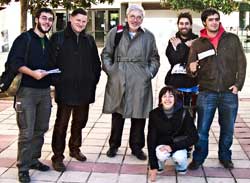INTERNATIONAL BRIEFS
European students, workers in motion
Published Dec 22, 2008 5:29 PM
ITALY
Hundreds of thousands of workers in different sectors of the economy left their
jobs Dec. 12 to take to the streets all over the country in the first general
strike since the right-wing government of Premier Silvio Berlusconi was voted
back into office last April. The strike takes place as economists predict a
severe downturn in the Italian economy with a drop in the GNP of one percent in
the coming year.
The largest demonstration took place in the city of Bologna, where 200,000
joined a march led by Italy’s General Confederation of Labor (CGIL), the
only labor center that had called the strike. Tens of thousands more
demonstrated in Turin, Milan, Venice, Rome and Naples, and other major marches
took place in Florence, Ancona, Bari, Palermo and Cagliari. The marches
included workers, students, teachers and others. At the main FIAT auto plant in
Mirafiori, half the workers walked out.
On the day of the strike, Berlusconi announced a one-year suspension of the
planned “reform” of higher education that students have been
protesting throughout the fall. (Avante, Dec. 18)
FRANCE
Concerned that a planned “school reform” would cut teacher jobs,
increase class sizes and in general diminish the quality of French secondary
school education, 150,000 high school students hit the streets Dec. 17 in
protest. In an immediate move to try to defuse the anger of the youths,
Education Minister Xavier Darcos postponed the “reforms” and
promised consultations.
According to reports in the media, French government figures feared that the
high school protests would spill over into the kinds of street actions that
were taking place in Greece. While the French economy has not experienced a
severe downturn such as that in Greece, this may be on the agenda even in the
most prosperous of the West European countries.
Youth in many of the high schools (lycées) continued the protests on Dec.
18, demanding guarantees that the government would postpone and re-discuss the
proposed changes.
CATALONIA/SPAIN
University students have been occupying buildings and holding other forms of
protest in different regions of the Spanish state since November to try to stop
the government from imposing the so-called Plan Bologna. This
“reform,” decided on in the Italian city six years ago, is meant to
create a more nearly uniform curriculum in the universities of the European
Union. But it also makes the courses more tuned into training students for
professions and more linked to private corporations rather than exposing
students to overall learning. In general, the process diminishes student input
into university curricula.
More than 100 student representatives from universities in Madrid, Barcelona,
Valencia, Seville, Burgos, Zaragoza, Cádiz and Málaga met for the
first time on a federal level on Dec. 13 and 14 in Valencia to coordinate their
mobilizations to try to put a stop to Plan Bologna. The student takeover at the
Autonomous University of Barcelona (UAB)—located about 10 miles from the
city center—began in mid-November and by early December these actions had
spread to many other places.
On Nov. 28, invited by one of the student groups, leftist Belgian media expert
and political analyst Michel Collon and Workers World managing editor John
Catalinotto, who were in Barcelona for a series of forums (see next), spoke on
the world economic crisis and the threat of war to some of the 600 students
occupying offices. Youth in the Spanish state have been hit hard by the
economic crisis, with unemployment for that group growing from 18 percent to 28
percent over the 14 months ending in October. (International Herald Tribune,
Dec. 19).
|
Michel Collon and John Catalinotto,
second and third from left with
four activist students from the
occupied Autonomous University
of Barcelona, Nov. 28.
WW photo
|
BARCELONA FORUMS
The Barcelona-based Pere Ardiaca Foundation invited political analysts from
different parts of the world to a series of four evening discussions held
starting Nov. 27 to discuss “Peace, War and Neo-liberalism.” Among
those speaking were Samir Amin, Egyptian political analyst and head of the
Forum of Alternatives; Catalinotto and Collon (see above); and three European
political analysts—Daniel Cireira from the French Communist Party, Willy
Meyer from the United Left in Spain and John Neelsen from the Rosa Luxemburg
Foundation in Germany—who shared the Dec. 1 forum. Catalonian
progressives introduced and chaired the discussions, which took place before
audiences of between 50 and 100 people.
As the forums coincided with a deepening awareness of the depth of the current
economic crisis, much of the commentary took up this harsh crisis and its
likely impact on both the drive to war and the potential for mobilizing against
war. The speakers represented diverse views on the left, but there was near
unanimity that the capitalist crisis was severe, that the government
intervention in the economies up to that point were solely directed at aiding
the big financiers and capitalists, and that neither the new U.S.
administration nor the European Union could be counted on to stop new wars or
end the existing occupations.
—John Catalinotto
Articles copyright 1995-2012 Workers World.
Verbatim copying and distribution of this entire article is permitted in any medium without royalty provided this notice is preserved.
Workers World, 55 W. 17 St., NY, NY 10011
Email:
[email protected]
Subscribe
[email protected]
Support independent news
DONATE


